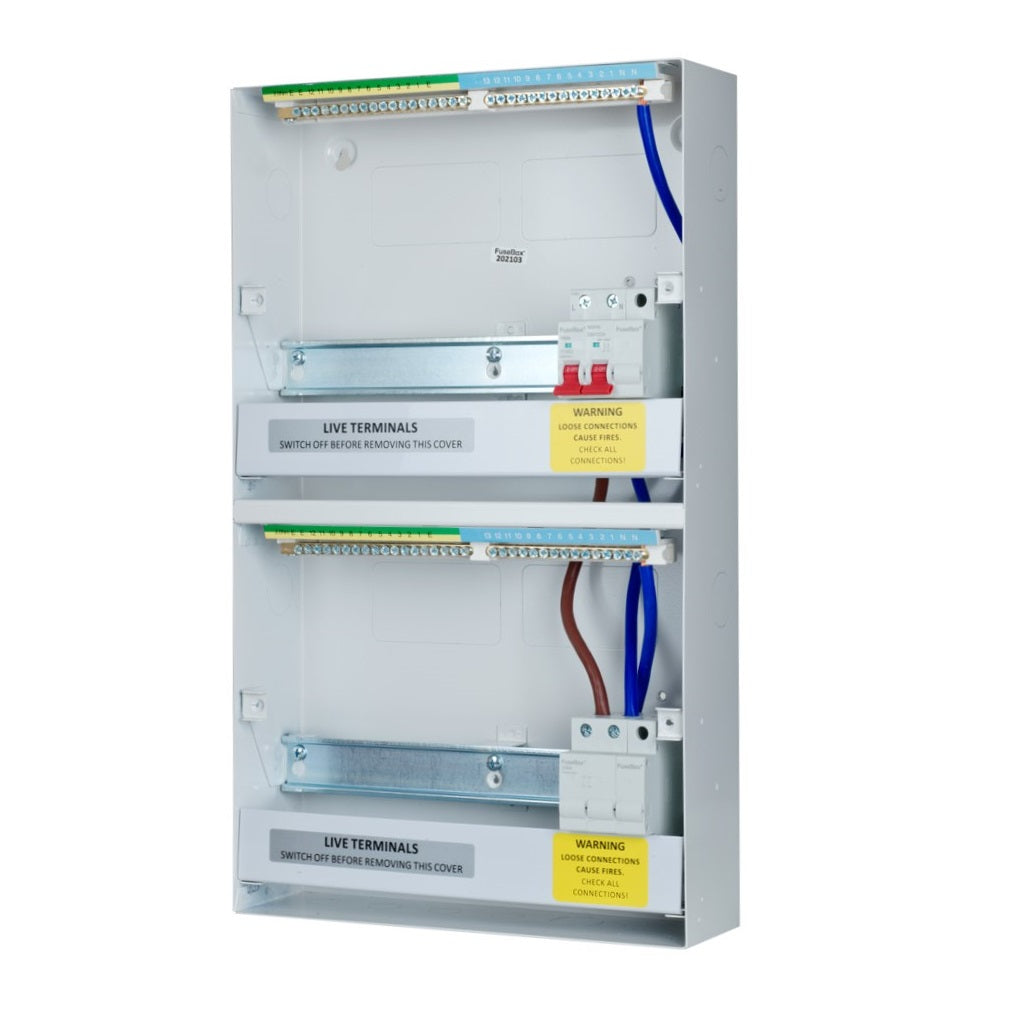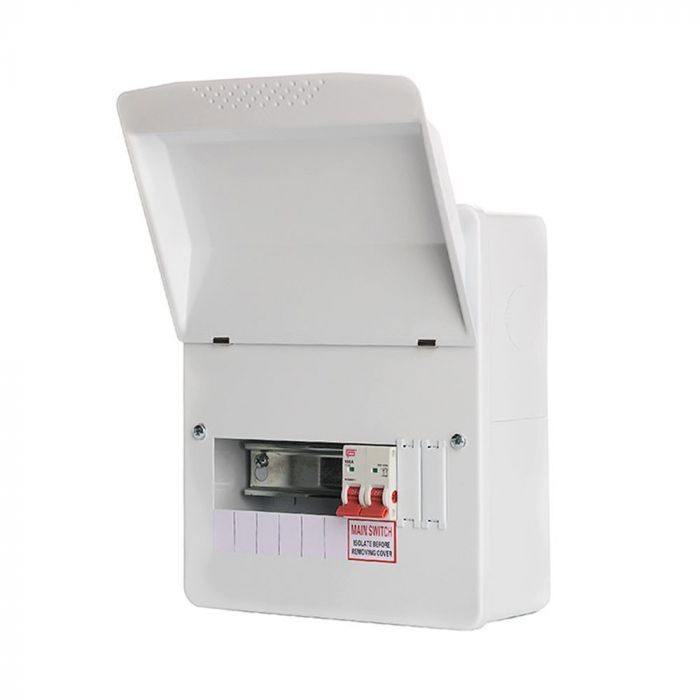The Function of Customer Devices in Efficient Power Administration Solution
Customer devices are integral to reliable energy administration systems, serving as the primary distribution points for electrical power within frameworks. The advent of wise modern technologies has better enhanced their functionality, enabling for real-time data monitoring and nuanced power intake evaluation.
Comprehending Customer Units
Recognizing the duty of consumer units starts with acknowledging their necessary function in protecting electric systems. By separating mistakes within certain circuits, consumer units protect against widespread interruptions and prospective fire hazards. This seclusion is achieved through making use of circuit breakers that trip or merges that strike when a mistake is identified, consequently cutting off the electrical circulation to the affected circuit.
Additionally, consumer units promote the well organized distribution of power, improving the efficiency of power usage. They enable the organized administration of electric lots, which can be specifically crucial in commercial and industrial setups where need can fluctuate substantially. Effectively conserved customer units contribute to the longevity of electric systems and help in minimizing downtime brought on by electrical failures, ultimately sustaining the seamless procedure of energy-dependent facilities.
Smart Technologies Combination

An essential benefit of wise consumer units is their ability to take advantage of progressed formulas and artificial intelligence for predictive analytics. This enables preemptive adjustments based on usage patterns, weather prediction, and various other variables, significantly boosting total performance. Clever customer systems help with need action programs, where energy usage can be dynamically adjusted throughout peak durations to stabilize the grid and decrease costs.
The combination of sustainable power resources, such as solar and wind, is additionally structured with wise consumer units. By wisely handling the intermittency of these resources, these systems make certain a balanced and dependable power supply. In addition, wise consumer systems enhance user engagement by giving thorough understandings and remote capacities through mobile applications, cultivating a more positive method to power conservation and sustainability.
Tracking Energy Consumption
Structure on the capacities of smart technologies combination, keeping an eye on power intake ends up being an essential focus within power administration systems. Efficient tracking works as the structure for recognizing power inadequacies and implementing corrective actions. By leveraging innovative metering infrastructure (AMI), real-time data on energy usage can be accumulated at granular levels, offering beneficial understandings into consumption patterns and peak need durations. This data-centric method makes it possible for both customers and energy managers to make enlightened decisions aimed at minimizing waste and improving overall effectiveness.
Smart meters and Net of Points (IoT) devices play a critical role in this tracking process. These devices can track energy use in real-time, sending data to central systems for analysis. The accumulated information is after that refined with innovative algorithms to find anomalies, anticipate future consumption, and recommend optimization methods. In addition, cloud-based solutions provide scalable platforms for keeping and evaluating huge datasets, helping with remote surveillance and control.
The assimilation of these innovations not only equips consumers with detailed information concerning their energy usage however also supports energy providers in taking care of load distribution extra effectively. Eventually, continual and accurate surveillance is important for achieving energy effectiveness, reference cost financial savings, and sustainability goals within power management systems.
Optimizing Appliance Usage

One effective method involves determining top and off-peak hours to shift energy-intensive tasks, such as washing or dishwashing, to times when power demand is lower. This not only lessens strain on the grid but likewise takes advantage of lower power tolls. In addition, integrating artificial intelligence formulas permits predictive maintenance, making sure appliances operate at ideal efficiency and extending their life-span.
Power administration systems can also incorporate user-specific choices and habits to customize device use schedules. For instance, smart lighting systems can change brightness based on tenancy and natural light schedule, while heating and cooling systems can preserve comfort degrees without extreme energy use.
Promoting Sustainability
Promoting sustainability within power administration systems involves not just improving efficiency but likewise promoting environmentally liable practices. Customer units are indispensable to this procedure, as they supply real-time data and control mechanisms that allow users to monitor and decrease their energy consumption. By leveraging advanced innovations, customer units can recognize energy-saving opportunities and promote the integration of renewable resource sources like solar and wind power.
One crucial aspect of promoting sustainability is educating consumers on the benefits of liable power usage. Via thorough insights offered by consumer websites devices, customers can make enlightened choices that lessen their carbon impact. These devices can recommend optimum times for running high-energy devices based on grid need and sustainable energy accessibility, thus reducing dependence on fossil gas.
In addition, consumer systems support the fostering of smart grid modern technologies, which enhance the total effectiveness and dependability of power distribution. By enabling two-way interaction in between consumers and energy carriers, these systems can dynamically get used to energy demands, reducing waste and promoting making use of lasting power practices.
Conclusion
Customer systems, as important elements of energy monitoring systems, dramatically boost electrical security and effectiveness within buildings through circuit defense and clever modern technology integration. Real-time information tracking and evaluation promoted by these devices enhance energy consumption and appliance use. Furthermore, the unification of renewable energy resources advertises lasting practices, adding to reduced overall power consumption and lower carbon footprints. Subsequently, consumer devices play a crucial duty ahead of time both power performance and ecological sustainability.
Breakthroughs in wise innovations have changed the capacities of power monitoring systems, particularly through the combination of clever consumer units.Structure on the capabilities of wise technologies assimilation, keeping track of power usage ends up being a crucial emphasis within power administration systems.Efficient device usage optimization is a crucial part of energy administration systems, aiming to boost efficiency and decrease unneeded energy consumption.Consumer devices, as essential components of energy management systems, substantially enhance electrical security and performance within structures through circuit protection and clever modern technology combination. Furthermore, the unification of eco-friendly energy resources promotes lasting practices, contributing to minimized Discover More Here overall energy usage and lower carbon footprints.